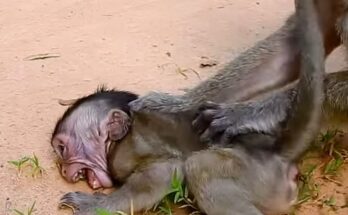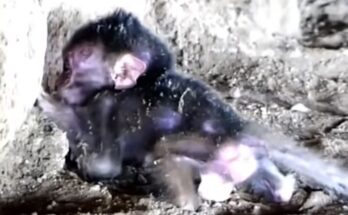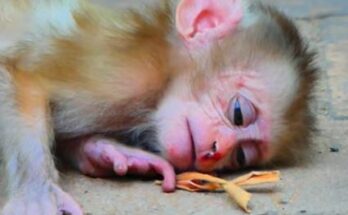Once upon a time in a dense, sun-dappled forest, a troop of monkeys lived high in the trees. Among them was a baby monkey named Milo. Milo was playful, curious, and full of energy, always leaping from branch to branch and giggling at the rustling leaves. Unfortunately, Milo’s stepmother, a large, stern-faced monkey named Mara, didn’t share his lighthearted nature.
Mara had joined the troop after Milo’s real mother disappeared. She was known among the monkeys for her sharp voice and strict rules. While other mother monkeys gently guided their babies, Mara often scolded Milo for the smallest mistakes—whether it was swinging too far from the group, accidentally dropping fruit, or playing too loudly.
At first, Milo tried to please her. He followed her instructions, stayed close, and even brought her the ripest bananas he could find. But no matter what he did, Mara seemed cold and distant. She would frown, snap at him, or ignore his attempts to show affection. Other monkeys noticed how differently Mara treated Milo compared to the other young ones, who received cuddles and kind words from their mothers.
Day by day, the harsh behavior took a toll on Milo. The cheerful sparkle in his eyes began to fade. He played less, and his boundless energy shrank. He stopped trying to swing the highest or find the sweetest fruit. The forest didn’t seem as fun when he constantly felt like he was doing something wrong. Deep inside, Milo’s feelings were bruised. He wondered if he wasn’t good enough or if something about him deserved the anger.
One afternoon, an elder monkey named Luma noticed Milo sitting quietly by himself, looking down at the forest floor. Luma, who had lived many seasons and watched over the troop with wisdom, gently approached him.
“Why so glum, little one?” she asked, sitting beside him.
Milo hesitated, but finally spoke. “Mara is always angry at me. I try to be good, but she still yells. Maybe I’m just bad.”
Luma’s heart ached at his words. She softly put her arm around him and said, “You are not bad, Milo. Sometimes, when someone has their own hurts or fears, they pass them on to others without realizing it. Mara’s harshness is not your fault.”
Over time, Luma started spending more time with Milo, encouraging him to play and reminding him of his worth. Other monkeys joined in, offering kindness and acceptance. Slowly, Milo’s spark returned, though the sting of his stepmother’s behavior still lingered.
Eventually, some of the other mother monkeys gently spoke to Mara, helping her see how her harshness had affected Milo. Though it took a while, Mara began to soften, realizing that she could offer guidance without coldness.
The story of Milo and his angry stepmother shows us how powerful words and actions can be, especially toward the young and vulnerable. Harsh behavior doesn’t just correct—it can wound feelings and dim a bright spirit. But kindness, understanding, and patience have the power to heal and help someone grow strong again, just like Milo.


